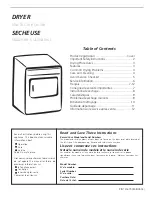
32
1.-INSTALLATION
Positioning and levelling
The positioning and electrical and gas installation should always be carried out by an AUTHORISED TECHNICIAN,
observing the standards of each country.
It is advisable to install an extraction hood for the optimum operation of the appliance.
Put the appliance in a sufficiently ventilated room, in accordance with the current regulations, to prevent the formation
of unacceptable concentrations of harmful substances in its installation site.
IMPORTANT: Except when indicated otherwise, the parts that must be protected by the manufacturer must not be
manipulated by the installer.
Level and adjust the height of the appliance. (Fig. 1)
Gas connection
The general installation should have a stop-cock and a pressure regulator and it also advisable to install a shut-off
cock on each individual appliance.
A tube of at least Ø 12 x 10 mm should be used for the appliance's gas connection, along with a ¾” nut.
Conversion to different gases
If the appliance is prepared for a different type of gas to the one available, you should proceed as follows:
Cut off the gas to the appliance if connected. (All conversions of the appliance's gas circuit must always be carried
out by a QUALIFIED TECHNICIAN).
Burner conversion
Injector replacement.
Dismantle the burners' “I” injectors (Fig. 2) and replace them with suitable ones depending of the gas to be used
(Table 4)
Burner air adjustment.
Set the air regulator “V” (Fig. 2) to the “H” measurement (Table 4) depending on the gas to be used.
Pilot light conversion
To convert to NATURAL GAS, please proceed as follows: Loosen screw “A” of the Fig. 3.
The 0.25 mm injector “B” is underneath screw “A”, which must be loosened and replaced by the 0.40 mm injector
supplied with the nozzles.
Turn the air regulator “C” until the flame steadies, fig 3.
After adapting the equipment to another type of gas or to another pressure, other than that for which it had
been previously set, the old instructions should be replaced with the instructions for the new settings, to
enable unambiguous identification of the state of the equipment after modification.












































